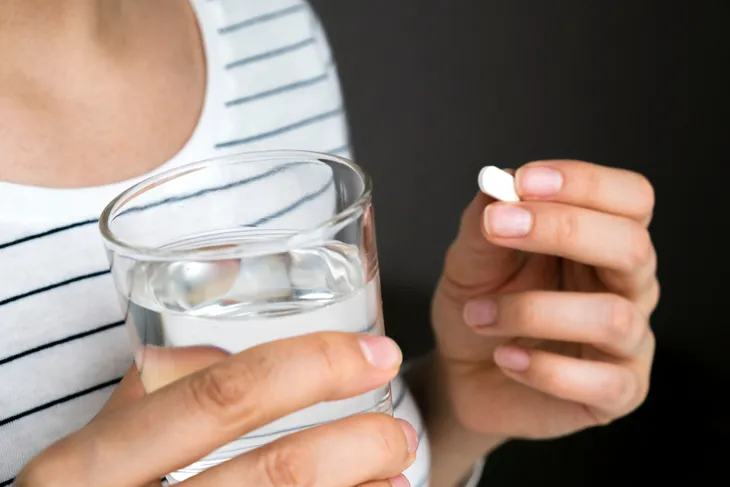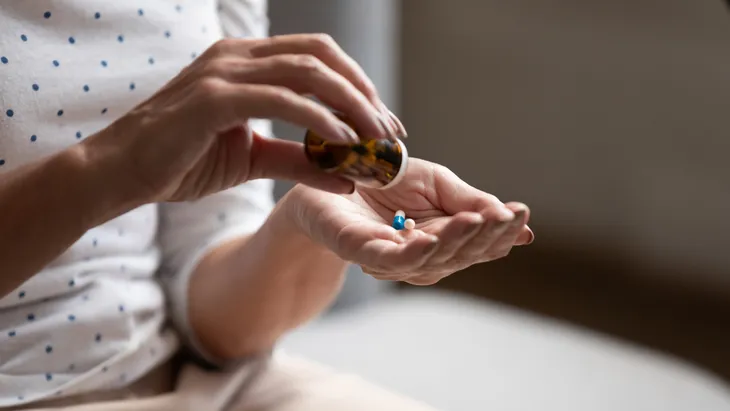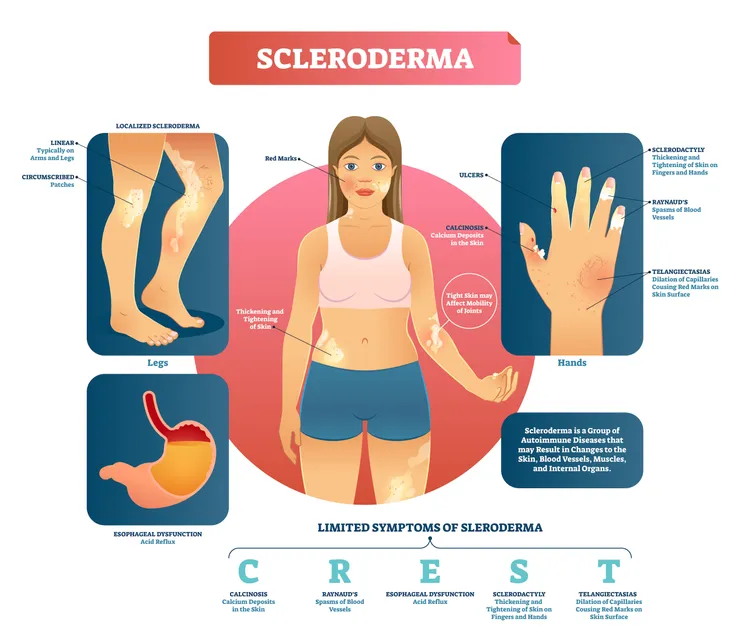Scleroderma is a type of skin disease that can result in the skin becoming abnormally hard and tight, sometimes resulting in redness, discomfort, and pain. In many cases scleroderma affects only the skin, but technically it can also affect connective tissues beneath the skin, including blood vessels and even internal organs.
Because scleroderma can affect so many different parts of the body, associated symptoms vary widely from person to person. Additionally, it tends to show differently in women than men and is more likely to affect women. It’s also more likely to emerge in people between the ages of 30 and 50. Unfortunately, there’s no comprehensive cure for scleroderma, but there are a number of treatments that can make a significant difference in improving a patient’s overall quality of life.
Medications that Dilate Blood Vessels
Because scleroderma often goes beyond impacting the skin (typically by making it harder and tighter) to the area beneath the skin, doctors may prescribe medications designed to help dilate the body’s blood vessels.
These medications will be familiar to anyone who has struggled with high blood pressure. That’s because the common goal is the dilation of the blood vessels, a process that can reduce the risk that scleroderma will become more problematic by affecting major organs like the lungs and kidneys. It’s worth noting that, once these kinds of major organs are affected by the disease, it may be difficult to reverse the damage.
Immune System Suppressants
Generally speaking, our immune system is one of our greatest allies in the ever-present fight against infections and disease. In most cases, if our immune system is strong and able to react quickly to a threat, our bodies are in a better position to fight off the problem and maintain our overall physical health.
But sometimes our immune system can actually present us with problems. Take, for example, when a person is diagnosed with scleroderma. In this case, the immune system can actually react in a way that leaves the individual less healthy than before — just as it can when a new organ is introduced to the body through the organ transplant or donation process. To alleviate many of the conditions associated with scleroderma, doctors may prescribe medications designed to help suppress the immune system and ensure that system reacts in a way that leads to more positive outcomes.
Pain Relievers
Scleroderma can affect many parts of the body, but it is most likely to emerge through the hardening and tightening of the skin. Although conditions vary from patient to patient, it has the potential to affect large areas of the body.
The result can be constant discomfort and pain for the scleroderma patient and this pain can be even more intense if the condition goes beneath the skin to the connective tissues, blood vessels, and major organs. For this reason, most scleroderma patients are prescribed some kind of pain reliever. At first these pain relievers may be your typical over-the-counter products, such as acetaminophen or naproxen, but if the disease spreads or worsens a doctor may prescribe more powerful pain medications.
Physical Therapy
By causing the tightening and hardening of the skin, scleroderma can make even small and simple movements incredibly difficult and painful. This discomfort and pain is only intensified if the disease spreads beyond the skin to the underlying tissue and the major organs.
For this reason, patients with scleroderma are often required to see a physical therapist on a regular basis. In working with a physical therapist to stretch out the affected areas of the body, a scleroderma patient can improve their strength and flexibility and better manage their pain. Overall, this can help a patient maintain a relatively normal lifestyle.
Surgery
As with any physical condition, surgery is seen as a last resort. This is because the complications associated with surgery may actually make the condition worse by putting an enormous amount of pressure on the body. In some situations, such as when the patient is of an advanced age, surgery may not be an option at all.
When it is an option, surgery may be about preventing scleroderma from spreading to other parts of the body. It may also be required to treat gangrene. Unfortunately, this may mean that the amputation of limbs is required.
Reduce Stomach Acid
Another way to treat scleroderma is to try and soothe any stomach problems that might arise. The best way to do this is to reduce the amount of acid in the stomach and control heartburn. WebMD explains that your doctor might prescribe medicine to help move the food through your stomach and intestines, or prescribe antibiotics. Controlling the amount of acid in the stomach and the symptoms of heartburn is only possible by using medications like omeprazole (Prilosec) which can relieve the symptoms of acid reflux, according to the Mayo Clinic.
When it comes to diet, you should probably avoid eating any foods that give you heartburn or gas, and avoid eating late at night. “Elevate the head of your bed to keep stomach acid from backing up into your esophagus (reflux) as you sleep. Antacids may help relieve symptoms,” says Mayo Clinic.
Drug Therapy of Vascular Disease
Vascular disease is common associated with scleroderma because it affects the medium and small arteries. It first presents itself as Raynaud’s phenomenon and has proven to cause episodes of ischemia (low-oxygen state) in other tissues, says The John Hopkins Scleroderma Center. To avoid organ damage, vascular disease must be treated and controlled. The source explains that there are three areas that need to be treated: vasospasm (spasm of blood vessels), proliferative vasculopathy (thickening of blood vessels), and thrombosis (blood clots) or structural occlusion of the vessel lumen (blockage of blood vessels).
The best way to treat vasospasm is with drug therapy that opens up the blood vessels. “The most effective and popular vasodilator therapy continues to be the calcium channel blockers (e.g., nifedipine). Studies demonstrate that the calcium channel blockers can reduce the frequency of Raynaud’s phenomenon attacks and reduce the occurrence of digital ulcers,” writes the source. “Although there are several vasoactive drugs on the market that are being used to treat vascular disease, there is no agent that is known to reverse the intimal proliferation (thickening of the inner layer of the blood vessel) that is part of the scleroderma vascular disease.”
Anti-Fibrotic Agents
Researchers are aware that scleroderma causes an excess amount of collagen to be produced in the skin and in other organs. There are many drugs that can be used to reduce the amount of collagen production or destabilize tissue collagen, says The John Hopkins Scleroderma Center. The following are some of the medications that can be used for this: colchicine, para-aminobenzoic acid (PABA), dimethyl sulfoxide, and D-penicillamine.
“Although there is evidence for and against the use of these agents, most experts are disappointed with them and believe that the benefit either does not exist or the drug is not potent enough to warrant its use. D-penicillamine remains a popular alternative for some experts, despite a controlled trial demonstrating no difference between low and high doses of the drug,” writes the source.
Protect Yourself From the Cold
Raynaud’s phenomenon is one of the earliest symptoms of scleroderma, but many people with this condition do not go on to develop scleroderma. Even so, those who are experiencing it can treat themselves by keeping their hands and feet warm. “Wear warm mittens for protection anytime your hands are exposed to cold — even when you reach into a freezer. When you’re outside in the cold, cover your face and head and wear layers of warm clothing,” writes the Mayo Clinic.
Stay Active and Stretch
In addition to any of the above doctor prescribed treatments, are there any things we can do at home to help manage the uncomfortable symptoms of scleroderma? Why yes, there is! The Mayo Clinic advises staying active with exercise. “Exercise keeps your body flexible, improves circulation and relieves stiffness. Range-of-motion exercises can help keep your skin and joints flexible.”
WebMD also advises stretching and even physical therapy because again, it helps improve flexibility and keeps the joints from becoming hard to bend. If this sounds like something you’d benefit from, talk to your doctor about recommending a physical therapist.
Don’t Smoke
Smoking is bad for anyone and everyone. Nobody should be smoking, especially nowadays when we know so much about the negative consequences and unfortunate health effects. People who suffer from scleroderma should be even more cautious to avoid smoking or quit smoking because “nicotine causes blood vessels to contract, making Raynaud’s disease worse,” writes Mayo Clinic. “Smoking can also cause permanent narrowing of your blood vessels.” If you’re having trouble quitting, talk to your doctor and he/she will help devise a plan to set you up for success.














